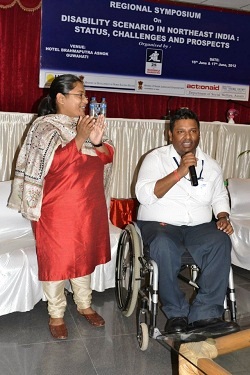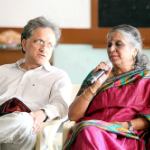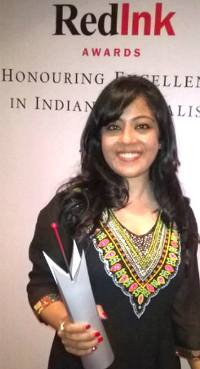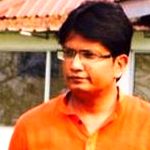I taught at the Rajiv Gandhi University (formerly Arunachal University) from 1999 to 2009. Located on top of a picturesque hill known as Rono Hills in Doimukh in Arunachal Pradesh, the University provided me with a wonderful opportunity to interact with outstanding faculty members from various parts of the country. Many of them later left the University and joined other prestigious institutes in the country.
The vibrant academic atmosphere and the welcoming nature of affable students, many of whom were first generation learners, meant that very soon I felt perfectly at home in Arunachal. Gradually, thanks to the nature of the academic world I and my wife lived in we gained familiarity with the intellectual life of Itanagar. In those days my wife was writing her PhD thesis on Lummer Dai and Yeshe Dorjee Thongchi while I was translating an Assamese novel by Thongchi into English.
Today when I look back at my years in Arunachal, some of the fondest remembrances are the ones of my interaction with wonderful writers that Arunachal has produced. And these associations have only grown stronger with time.
The one thing that always appealed to me was the friendly nature of the people of Arunachal. Even the most veteran politician or bureaucrat seemed accessible, their faces radiant with smiles. This struck me as something unusual for in Assam I was pretty used to sights of stiff upper lip politicians and bureaucrats, constantly barricaded by security men.
Yeshe Dorjee Thongchi was serving as Commissioner to the Government of Arunachal Pradesh when I met him for the first time. My first encounter with him left an indelible impression in the mind. I called him up to fix an appointment on a Sunday. His beautiful house, modelled on the Tibetan architectural style, located on top of a hill in Itanagar was thirty kilometers away from the University campus. As I approached the gate of his house with my wife and two-year-old son, I saw Thongchi rushing out of the house to open the gate and usher us in. I did not know how to react; there had not been too many occasions in my life when I had an IAS officer standing at the gate of his house to welcome me. Albeit Thongchi's gesture was humble, it was not of the pretentious variety that one comes across so frequently these days. It was just about keeping things simple - I was a first-time visitor to the house and it was perfectly alright for him to be waiting for me near the gate.
This reminded me of the rather funny experience of a colleague of mine after he joined Arunachal University. Close to the University are beautiful forested hills and this colleague was happily trudging up the hills one day when he felt a creepy sensation on his leg. He sat down on a rock to take a look and discovered that he had attracted the attention of a monstrous leech. Around the same time he saw a man dressed in the traditional attire of one of the Arunachalee tribes come rushing towards him with a huge knife in one hand. For a moment my colleague was sadly reminded of the impending separation from his wife and kids. My colleague had heard many stories about the way in which "scantily-clad da-wielding natives" could kill people at the slightest provocation. But all the man did was to skillfully use the knife to remove the leech.
We talked to Thongchi for a long while and met his wife and eldest son. Our discussions mainly revolved around literature, Assam and Arunachal Pradesh. Thongchi's reading room on the first floor presented a scenic view of the hills and I discovered a huge collection of books on the shelves. Sadly, not many people in Arunachal are aware of the literary talent of this precious writer. I realized during our first meeting and on subsequent occasions too that Thongchi always pined for intellectual company.
Once when Thongchi was addressing a public meeting on the occasion of a book fair, I saw him cry with sheer joy. He frankly expressed his delight at the realization of his long cherished dream of Itanagar hosting a relatively big book fair. In Thongchi I discovered a man who was passionate about books. Those familiar with the writings of Thongchi will realize that he has a tremendous sense of humor. In real life his deadpan humor can send people into peals of laughter. But beneath an easygoing self is a man who is extremely serious, thoughtful and deeply in love with his works, of which he is immensely possessive.
Mrs Nanni Dai, wife of Late Lummer Dai, once narrated to me an incident on the seriousness of writers vis-a-vis their works. Lummer Dai was in the final phase of writing his novel Kanyar Mulya (Bride Price) when his wife discovered him restlessly pacing around the room, lost in thought. When she enquired into the reason he replied in exasperation, "Gumba is going to die! Gumba is going to die!" Gumba was his protagonist in Kanyar Mulya. Lost in his fictional world, Lummer Dai was thinking about a way to rescue his protagonist, fighting for her life in the battle against the repressive norms of patriarchy. Playing along with her husband, Mrs Dai suggested to her husband that Gumba be given orange juice to help her regain strength. Pat was the writer's reply, "Now is summer time. Where will you get oranges in summer?" In reality it was winter then, but the writer, lost in the literary world that he had created, was living in a "fictional" season. Such is the involvement and passion of writers.
Lummer Dai was much more than a writer; he was a newspaper editor and an administrator, besides one of the leading activists of the state, playing a crucial role in the institutionalization of Donyi Polo-ism. Inside the compound of his house in Naharlagun stands a Donyi Polo temple. His wife has lovingly assumed responsibilities of the legacy left behind by him, including charge of editor of Echo of Arunachal.
Mamang Dai, a distant relative of Lummer Dai, lives in Itanagar. Her father was the first chief secretary of the state and has an old-world charm that is endearing. Mamang Dai's writings, steeped in Arunachal, reveal the haunting sonority of the Siang. Her writings are a celebration of the inherent sacredness of all forms of life. As an individual she is no different. Her pleasant demeanor augments her unaffected warmth. When I visited her house for the first time I discovered another aspect of her versatility - she happens to be a remarkably gifted painter. On my second visit to Mamang Dai's house I accompanied Kannada writer and academician and also Jnanpith awardee U R Ananthamurthy. We were invited for dinner, and Mamang cooked the food herself. It was a treat to watch and listen to the two writers discuss literature. I distinctly remember the veteran Kannada writer saying at one point that the best possible combination for an Indian writer is an intimate understanding of Indian rural life and Western education.
When I teach my students about the contemporary ecological philosophy of Deep Ecologists who talk about the folly of viewing the environment from the exclusive point of view of humans I think about Mamang Dai's poems and the traditional society of Arunachal Pradesh. Indeed, long before the advent of deep ecology which we have now imported from the West, there were societies in our country whose members did realize the folly of looking at non-human life from the point of view of humans alone. They, as Mamang Dai tries to tell us through her poems, considered all forms of life to be sacred.







































